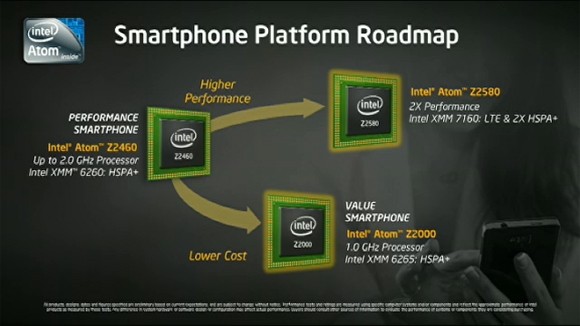Intel offered a glimpse at its plans for the smartphone market today at MWC and shared some details on three different Atom chips destined for handsets in 2012. The first of the bunch is the Atom Z2460, a single-core, dual-thread chip clocked at up to 2GHz with an integrated GPU that can reportedly handle 1080p video decoding and encoding at up to 30 FPS. It is currently shipping to OEMs and serves as the heart of the reference platform that upcoming devices from Lenovo, Orange, Lava and ZTE are based on.
The Verge got some hands-on time with Orange's Intel-equipped handset – codenamed Santa Clara – and came out impressed with its responsiveness and ability to run Android apps and games without a hitch. It has a 4.03-inch, 1024 x 600 display, along with an 8-megapixel camera capable of shooting 1080p video and 10 photos per second in a burst mode. Disappointingly, it will be running Android 2.3 when the phone arrives this summer in France and the UK, but Orange says that an update to 4.0 Ice Cream Sandwich is coming.
Intel also talked about a next-generation Atom Z2580 that's said to offer dual cores for double the performance of the Z2460 and will be paired with the XMM 7160 radio, an advanced multimode LTE/3G/2G solution. That model won't begin sampling until the second half of the year, however, with actual products based on the chip not expected until sometime in the first half of next year.
Lastly, Intel is also working on a more affordable option in the form of the Atom Z2000. This single-core chip is built using the same 32nm process as its higher-end siblings, but is clocked at 1GHz and there's no mention of Hyper-Threading support. It will be paired with a 6265 HSPA+ radio and should begin sampling later this year, with products targeting the sub-$150 segment scheduled for early 2013.
Building on these 32nm announcements, Intel CEO Paul Otellini discussed how the Atom processor will outpace Moore's Law with a 22nm SoC planned for carrier certification next year and development already underway on 14nm SoC technology. Whether they'll finally be able to chip away some smartphone market from ARM remains to be seen, but we wouldn't brush aside a company with the resources and expertise of Intel.
